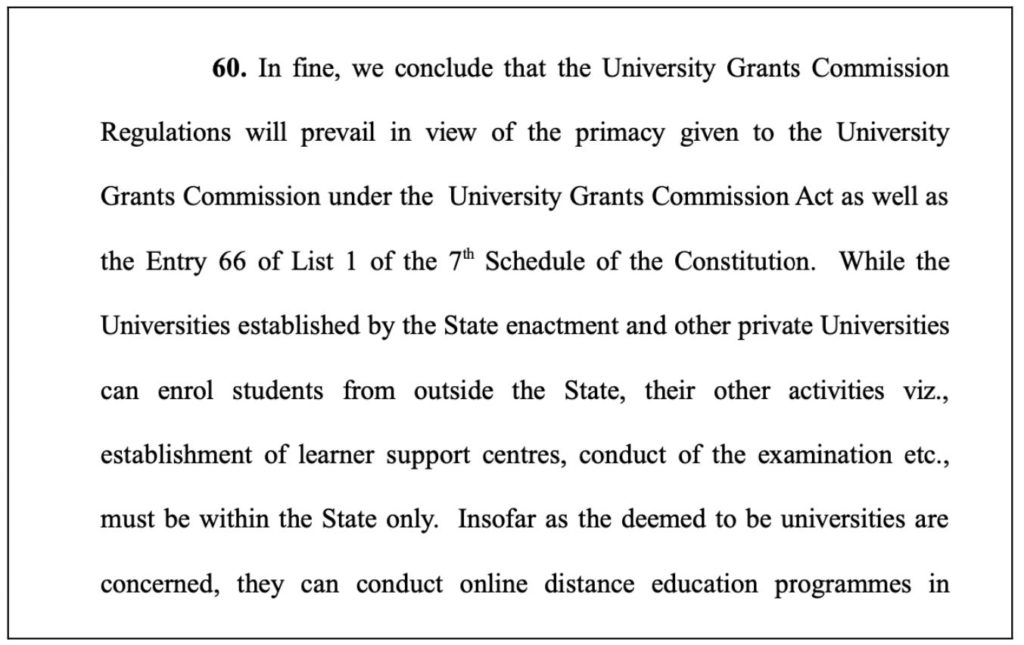In this week’s review of Court Judgments, we look at the Supreme Court’s judgment regarding right to property of successors of heir who has relinquished his rights, Karnataka High Court’s judgment in an accident insurance case, Kerala High Court’s observation relating to non-entitlement for maintenance of an unmarried daughter, Supreme Court’s observation regarding temporary acquisition infringing Right to property and Madras High Court’s judgment establishing primacy of UGC.
Supreme Court: When a person has relinquished rights in father’s self-acquired property, his sons are estopped from claiming share.
Supreme Court bench comprising of Justice K.M. Joseph and Hrishikesh Roy observed that when a son relinquishes the right to the self-acquired property of the father, then the principle of estoppel is applied, and his sons do not have a claim on that property.
As per the case details, a suit for the partition of the property was filed by two children from a man’s second marriage. The property was a self-acquired property of Sengalani Chettiar, who had a son from his first marriage. He further has five daughters and a son from his second marriage.
Chandran, the son from his first marriage executed a ‘Release Deed’ in 1975 before his death. Chettiar died in 1988 and his wife from his second marriage died in 2005.
Subsequently, the suit for partition was filed by two of the children from the second marriage. The defendants in the case were the successors of the son from the first marriage. The plea of the plaintiffs was to exclude them based on the Release Deed. However, the Trial court held that the release deed was void as it was executed by the son, while his father was still alive. It proceeded to allot the plaintiffs 2/7 share. This order was challenged in the High Court and was allowed. The sons of Chandran, son of Chettiar through first marriage approached the Supreme court.
Supreme Court noted that the suit property is a separate property of the Chettiar. It then looked into the tenets of the Transfer of Property Act and observed that the person who would be entitled to succeed upon the death of a relative would not have the right until death. Since it is a separate property and not the case of a co-parcener (acquiring right on a joint family property by birth), the ‘Release Deed’ would not have an effect on the transfer of rights.
The court proceeded to delve into the conduct of the son who has executed the ‘Release Deed’. Based on the ‘Release Deed’, it was inferred that the intention of the father was to deny any right of the son in regard to the property. It was contended that as per the Hindu Minority and Guardianship Act, the natural guardian cannot bind the minor by a personal covenant. The argument put forth by the appellants before the Apex Court was that they were minors at the time of the ‘Release Deed’.
However, the Court refused to discard the ‘Release Deed’ based on this argument and noted that Chandran himself had no right on the property. In regard to estoppel, the Court referred to Section 8(a) of the Hindu Succession Act, as per which the rights would not devolve on the appellant whose father was estopped to inherit the property in view of the relinquishment.

The court noted that there is a clear case of estoppel which resulted from Chandran relinquishing his rights, thereby allowing his father i.e., Chettiar free to deal with the property without being haunted by any claims from him or his successors. Hence, the Apex Court found no merit in the appeal and dismissed it.

Karnataka HC: Insurance Company liable if ambulance meets with an accident and patient being shifted for better treatment succumbs to his ailment.
In the case, National Insurance Company Ltd vs. Menpa Maistry & others, a single bench of the Karnataka High Court said that an insurance company is liable to pay compensation to a patient who succumbs to his ailments, when the ambulance in which he is being shifted for better treatment, meets with an accident.
The deceased in this case was suffering from Jaundice. To provide better treatment, he was carried in an ambulance from Chikmagalur to Mangalore. en route, the ambulance which was being rashly driven toppled on an overbridge causing injuries to the deceased, who later succumbed to injuries at Mangalore hospital.
The insurance company initially maintained that there was no connection between the accident and the death of the deceased. The FSL report stated that the death was due to Pneumonia and Tuberculosis and was not on account of the accident. Hence, the claim of the insurance company was that the tribunal ought to have initially rejected the claim.
However, the claimants argued that he would have survived if he was admitted to the Mangalore hospital. The accident in between aggravated the ailment and caused his death. The bench agreed with this and observed that had the patient been successfully carried to Mangalore hospital, he could have been cured, as jaundice is not a fatal ailment and can be treated in such higher medical centres.
It also noted that despite the knowledge that he was carrying a patient, the driver did not take any precautions and his negligence caused the accident. The court further stated that it finds a nexus between the accident and the death of the deceased.
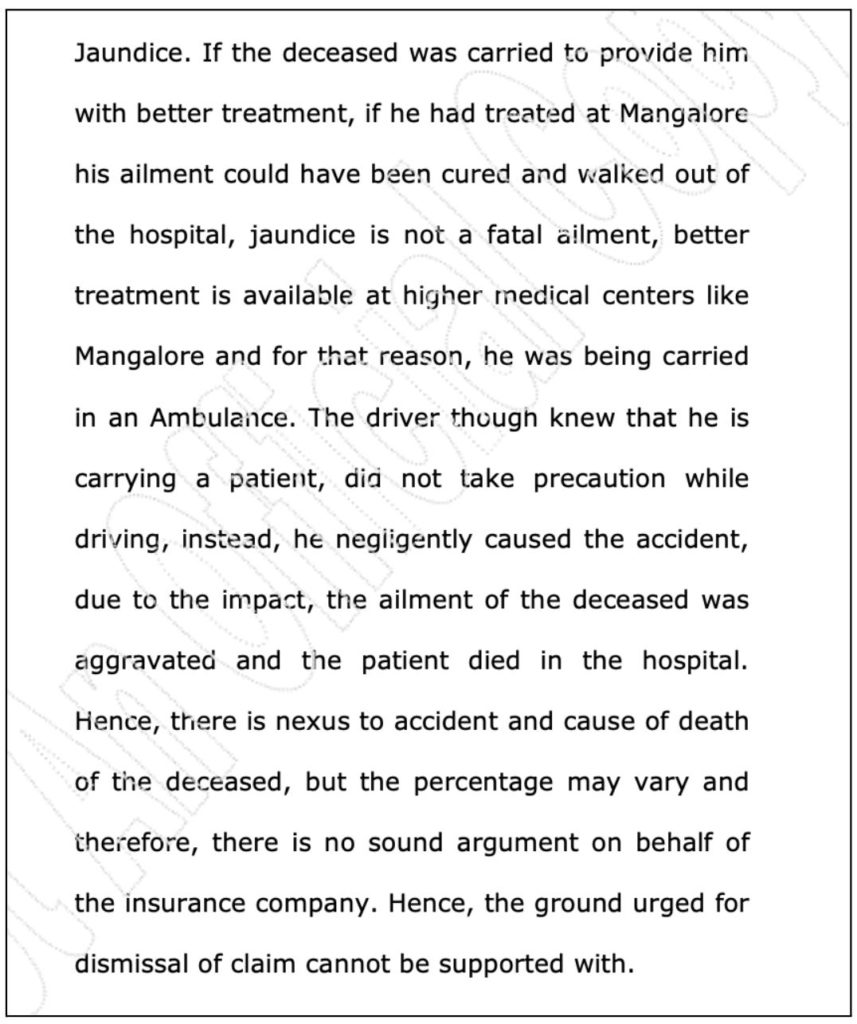
Kerala HC: Major unmarried daughter not entitled to maintenance from father merely on the ground that she is unable to maintain herself.
In the case, Gireesh Kumar N vs. Rajani K V and Anr, Justice A. Badharudeen of Kerala High Court, stated that an unmarried daughter who attained majority cannot claim maintenance from her father, merely on the ground that she does not have any means of sustenance.
It reiterated that the claim of maintenance can be made in case of an unmarried daughter unable to maintain herself due to any physical or mental abnormality, subject to evidence.
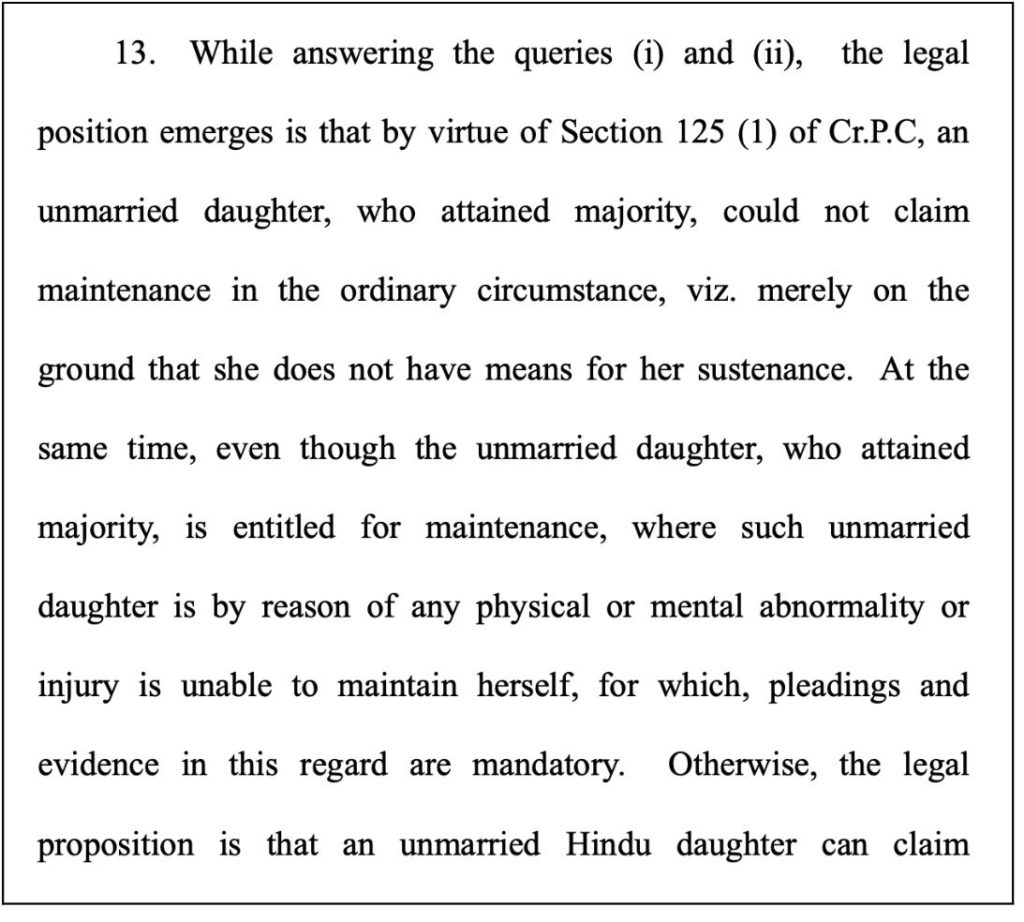
The Court was hearing a revision petition against a Family Court order that granted maintenance to the petitioner’s wife and daughter.
One of the questions before the High Court was whether an unmarried daughter can claim maintenance under Section 125(1) of CrPC after attaining a majority. In the case put forward by the petitioner, it was submitted that there is no evidence to substantiate that the daughter suffers from any physical or mental abnormality or injury, which would render her incapable of maintaining herself.
The Court reviewed the evidence and agreed with the submission of the petitioner and noted that there is no evidence to show that the respondent i.e., daughter has any physical or mental abnormality. Hence, it held that the Family Court’s grant of maintenance to the daughter is erroneous.
Supreme Court: Land cannot be kept under temporary acquisition for years as it violates Right to Property.
Supreme Court bench comprising of Justice MR Shah and Justice MM Sundresh held that continuing with the temporary acquisition of land for a number of years would be arbitrary and is said to be infringing on the right to use the property, guaranteed by the Constitution of India.
The bench made this observation in the case, Manubhai Sendhabhai Bharwad and Anr vs. Oil and Natural Gas Corporation Ltd & Ors.
A civil appeal was filed by the appellants, who were also the original writ petitioners and the landowners, in the Supreme Court. They were aggrieved with the judgment passed by the High Court of Gujarat, which dismissed their writ petition to quash temporary acquisition proceedings.
The land in question is under the temporary acquisition of ONGC since 1996 for the purpose of exploration. This land was purchased undisputedly by the appellants in 2005. The appellants stated that they are being paid the rent at the rate of Rs. 24 per sq. meter per annum for temporary acquisition. However, there is an appreciation in the price of the land over the period with development in the surrounding areas.
They had earlier approached the High Court seeking directions to the respondents to either acquire the land on a permanent basis or release the land from acquisition. The writ petition was disposed based on the respondent’s stand that they would initiate the process to acquire the land permanently. Since there was no action in this direction, the appellants once again approached the High Court.
They contended that the temporary acquisition for 25 years is unreasonable, that too with such low rent. Responding to this, ONGC submitted that the request for approval for the acquisition of the land on a permanent basis is under process. ONGC placed an undertaking that the process would be completed in 12 months. Based on this, the High Court rejected the petition to quash the temporary acquisition or increase the rent.
An appeal was filed in the Apex court, wherein the appellants submitted that temporary holding of the land for 25 years and paying less rent is arbitrary and unreasonable. It was also submitted that it has been six years since the assurance to permanently secure the land was made.
ONGC stated that the land was acquired temporarily for exploration and the rent has been paid subject to revision from time to time, which was voluntarily accepted by the owners.
The Supreme Court stressed on the fact that the land in question is in temporary acquisition for a long period of 26 years. If it continues with the same, the purpose of temporary acquisition loses its significance. It stated that this infringes on the right to use the property guaranteed under Article 300 A of the Constitution of India.
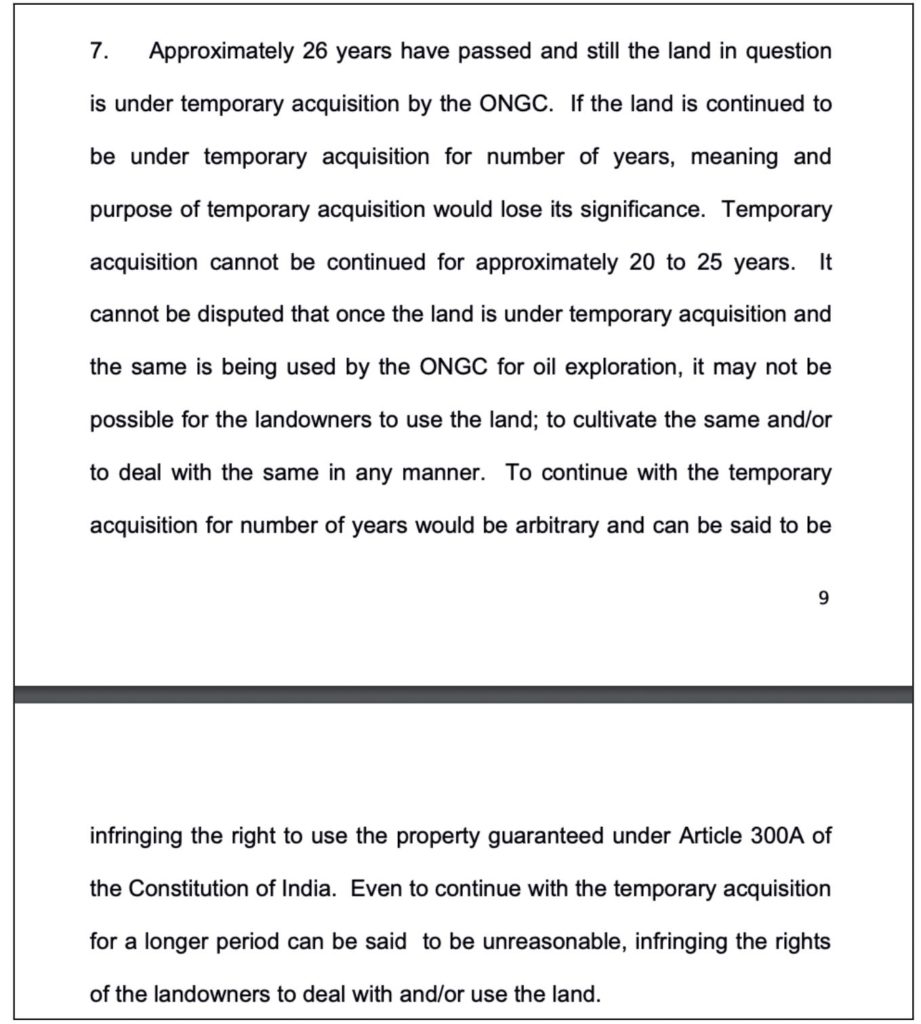
It noted that a writ of mandamus was issued by the High Court to ONGC to complete the acquisition on or before 26 April 2023, and on the failure of which, there would be necessary consequences.
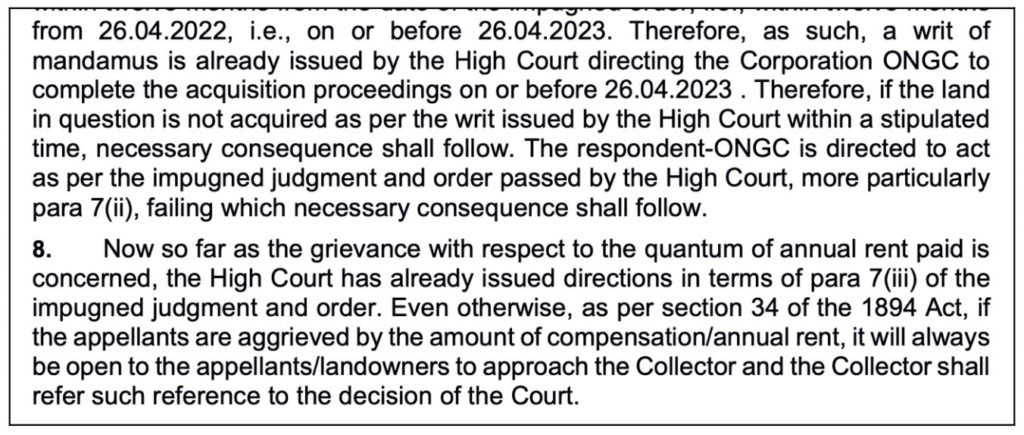
Madras HC: Upholds UGC’s power to impose territorial restrictions on Distance Education Courses.
In the case University Grants Commission and Anr vs. Annamalai University & Ors., Madras High Court upheld the power of UGC to impose regulations for the conduct of Distance education programmes by the Universities.
In August 2012, UGC has imposed a condition that the territorial jurisdiction with respect to the distance education programs was to be decided by the Distance Education Council (DEC).
DEC held that the territorial jurisdiction of the State Universities will be as per the Acts and Statutes of the universities but not beyond the boundaries of the respective states.
This was challenged by many universities on the ground that DEC has acted beyond its powers under the UGC Act and Annamalai University Act 1929. It was submitted that the condition would defeat the very purpose of distance education.
UGC countered this with the submission that the direction was a result of the observations made by the Apex Court in an earlier case wherein the Court criticised the manner in which permissions were granted to universities offering distance education programmes.
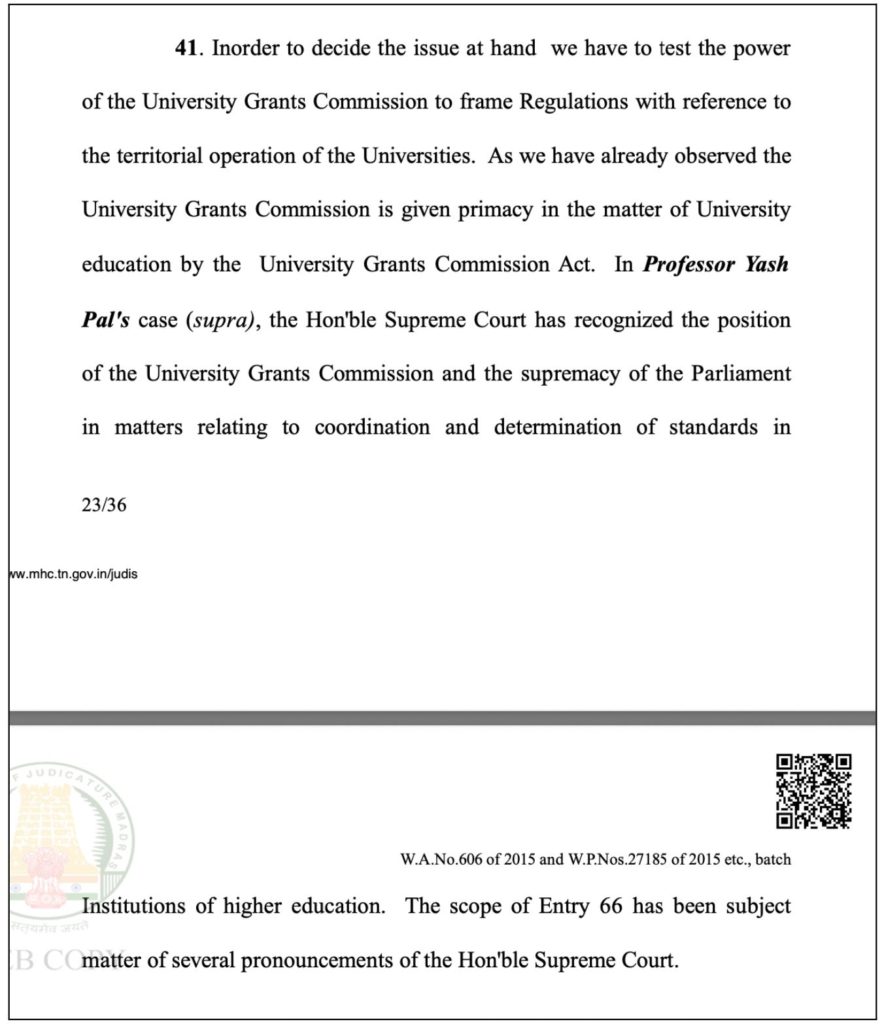
The High Court noted that Parliament and UGC have supremacy over the matters relating to the determination of standards in institutions of higher education. It upheld the power of UGC and gave relief to the students who were already admitted to the educational institutions.
